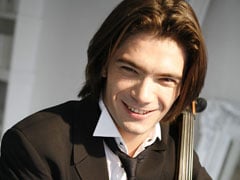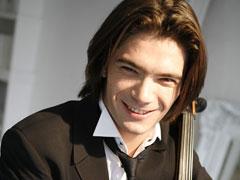
At 30, cellist Gautier Capuçon is riding a wave of success — and his smoldering French movie-star looks don’t hurt matters. His calendar is black with upcoming debut engagements around the globe, including a series of concerts with the Berlin Philharmonic under the baton of Capuçon’s favorite contemporary, Gustavo Dudamel.
Born Sept. 3, 1981, in Chambéry, Savoie, the cellist, who now lives in Paris, also concertizes with his older brother, violinist Renaud Capuçon. In June the dynamic duo will appear together for the first time in Los Angeles performing the Brahms Double Concerto with Dudamel on the podium at Disney Hall. The June 5 concert will be broadcast live to 500 theaters throughout the U.S. Capuçon’s next engagements are with the San Francisco Symphony, April 14-17, at Davies Symphony Hall, with conductor Charles Dutoit.
The first opportunity that Bay Area audiences had to see Capuçon was in November 2009, when he made his San Francisco debut with conductor Semyon Bychkov performing the Schumann Cello Concerto. What most people don’t realize is how close Capuçon’s San Francisco premiere came to being his swan song.
I spoke with Capuçon from Lucerne, Switzerland.
According to all I’ve heard, your first visit to San Francisco was memorable, to say the least.
Definitely, it was memorable. [Laughs] It almost didn’t happen at all. The night before my debut, I met with Semyon Bychkov. We were preparing for the Schumann concerto. The next morning was the first rehearsal with the orchestra, and it went really well. I was so excited! Then I started having stomach problems. I knew something strange was going on inside. You know how some people have stomach problems when they are nervous? I’d never had stomach problems in my whole life.
Featured Video
By midnight the pain was so strong I was lying on the floor in my hotel. That’s when I decided to call the doctor. The doctor came two hours later. By then the pain was really horrible. He examined me and said it was appendicitis and I had to go straight to the emergency room to be operated on. I told him that’s not possible: “I have to play a concert tomorrow!” He stayed with me for two hours talking to me. Finally I said, “Let’s make a deal. You can drive me to the hospital, but you have to promise me I don’t have to wait — I know what emergency rooms are like; you can spend the whole night there.” He said, “OK.”
Of course, it was appendicitis and they operated on me right away. Afterwards the doctor told me if I had waited five more minutes it would have ruptured and I probably would have died. I was quite lucky.
The next morning I was back in the hotel and I tried playing my cello and I felt fine. So I called the Symphony and told them I could play the second concert. They had had to cancel my first. Then my agent called and spoke to me. She spoke to me like my mother. She said, “No way! It’s too risky.” I did play the last concert and it was great. It’s funny: Just before you called, I sent an e-mail to the surgeon, inviting him to the concerts I’m about to do.
Tell me about the concerto you will be playing with San Francisco, the Tout un Monde lontain [roughly: “A whole world far away”], by Henri Dutilleux.
It’s a contemporary piece. It was written in 1970 for Mstislav Rostropovich. It’s not so well-known, but this piece is really part of the big cello repertoire; it’s as big as the Dvořák concerto, for example. I think what is important to say about this piece is that people should not be afraid of it, just because they may not know this composer. His music is so touching and goes so deep. It’s in five movements, and each movement is inspired by a quote from the poet Baudelaire.
Your career seems to be going very well. Are you enjoying yourself?
I’ve been performing now for 12 years and I’m very happy. It seems like every year is my debut year. My life is very rich, though it’s tiring to have to travel so much. I’m also married and have a 20-month-old daughter. Her name is Fay. So my life is changing a lot. She’s starting to talk, and now when I leave she says, “Daddy, no!” Which makes it hard for me.
You often perform with your brother. Are you the male equivalent of the Labèque sisters?
Oh, absolutely not. [Laughs] Katia and Marielle play almost everything together. My brother and I did that for a while. But for the last three seasons we’ve done that much less. Playing together is a very special relationship, but you have to find just the right balance. Now we play 15 to 20 concerts a year together, so we protect our own space.
What music do you listen to, other than classical?
I’ve listened to jazz since I was young. I love jazz. If I am in the car, I can listen to almost anything. I love rock. I don’t know if you know the group Muse? They are a group I like a lot.
Do you think it is important for classical music orchestras to reach out to younger audiences?
It is very important to perform for young people, to open up rehearsals and chat with them. But we shouldn’t worry about the audience. The audience for classical music has never been young. It takes a degree of maturity. I doubt that 50 or 150 years ago half the audience was under 30.

